A Tale of Two Cities
With award-winning compositions, arrangements, productions and
engineering among his accomplishments, Robert Slap's original music spans a
wide spectrum of styles and influence. It ranges from R&B, Rock, Soul/Funk,
and Jazz to New Age, Latin, World, and music for films.
Early Years: The 1950s
and 60s – Building Chops
Born in the Polish blue-collar town of Hamtramck,
MI adjacent to Detroit, Slap’s family lived with
his grandparents until his parents bought a house in suburban Roseville. As the grandson of two sets of
Polish immigrants, young Robbie grew up listening to records by Harry
Belafonte, Al Hirt, Detroit’s
own Gaylords and an abundancy of polka music. His Grandpa Zig mastered the
harmonica and was proficient on the chromatic, so there was always music
present in the house. Slap watched Leonard Bernstein's Young People's Concerts
on TV, fancying himself taking the podium to lead the orchestra.
Slap launched into trumpet lessons at about age 10, continuing
throughout high school. He performed with the marching and concert bands, drum
& bugle corps and learned to read and write music, which he considers his
second language — a considerable benefit in his musical career.
 |
1st Performance 1962, E.Detroit, MI
Novak Music Conservatory |
The first concerts Slap attended were the Motown Revues at Detroit’s Fox theatre,
where he watched all the legendary artists perform.
But the kindling of his personal musical ambition really caught fire when he
tuned into the Beatles’ American debut on the Ed Sullivan Show in February,
1964. That further inspired the purchase of his first guitar/amp combo from
Sears, a Silvertone, made by Danelectro. Slap found playing the guitar more
enjoyable than the trumpet, learning the basics from music books while
listening to area radio programs late each night. He searched for new music
styles to master, a unique variety exploding at the time onto local and global
airwaves.
Slap practiced on his new guitar with schoolmate Jon Wearing,
whose older brother, Tom, led a trio, a group called the Tidal Waves. Superior
musicians and vocalists, the group was known as one of the most popular bands
on the east side of Detroit.
Jon Wearing and Slap sat in on the band practices in the garage or basement of
the Wearing house, ironically located on Roseville’s
Rock street.
That birthplace of Roseville
rock was also just a few doors down from the Levise family, whose oldest son,
William, later gained international fame as performer Mitch Ryder.
In mid '65, Slap joined the Tidal Waves, bringing his expertise
on the bass guitar and knowledge of current hits by the Ventures, Beach Boys
and Beatles. The group played predominantly at teen clubs, competing in “battle
of the bands,” entertaining at outdoor parties and as active leaders of what is
now referred to as "Garage Rock." Jon Wearing further helped the band
grow by adding vocals and more percussion.
 |
| Detroit News 1966, Official Promo Photo |
Slap’s recording career kicked off in 1966 when he signed with
SVR Records, a local label, and the Tidal Waves released the single, “Farmer John”/”She Left Me All Alone". The record broke big in the Detroit area, leading to a national contract with
Hanna-Barbera Records in Los Angeles.
The Tidal Waves shared the bill at shows with many great artists of the 60s:
The Dave Clark Five, the Animals, Paul Butterfield Blues Band, Herman's Hermits
and Detroit
groups Mitch Ryder & the Detroit Wheels, the MC5, Bob Seger and the Last
Heard, and more. Those connections also led to Slap meeting future bandmates
Dennis “Machine Gun” Thompson and John Angelos.
But the Tidal Waves weren’t successful with two subsequent
singles and by 1967, Slap left the group to pursue other musical ambitions. He
was especially intrigued, and influenced, by the release of popular albums,
Cream’s “Fresh Cream," "Sergeant Pepper’s Lonely Hearts Club Band” by
the Beatles and Jimi Hendrix’s "Are You Experienced?"
His passion was to write original songs as well as play guitar
and sing. He formed a new group with friends and classmates in 1968, Freewood,
performing with them through 1970. This allowed Slap to forge his own path in
what was to become a lifetime career. The edgy new band strived to create its
own brand of music, appearing with other popular acts like LA’s Electric Prunes
and Phoenix
natives, the Alice Cooper Group.
 |
| Sugarbush Ranch, New Baltimore, MI 1970 |
It was also during this time that Slap struck up a friendship
with fellow Roseville
musician, folk singer/songwriter John Mariotto, who performed under the name of
Jonathon Round. Slap was remarkably impressed with Round’s vocal and
songwriting prowess, and the two spent many evenings in area restaurants and
coffee shops sharing ideas. Round’s insights into the world of folk music
provided new depth as he shared the work and philosophical struggles of Woody
Guthrie, Bob Dylan and Joni Mitchell, who also lived in Detroit from 1965-1967. Round subsequently
released a solo album in 1971 on Westbound Records, which was hailed for his
distinctive cover of the Rolling Stones’ hit, “Sympathy for the Devil.”
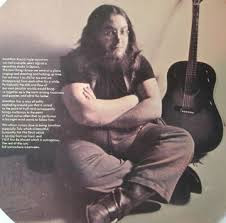 |
| Jonathon Round Album Cover 1971 |
The 70s – Climbing the
Ladder
In addition to music, Slap was also interested in movies and
theatre. He dove into drama classes and events, performing in high school
musicals, followed by similar studies at Oakland
University and Wayne State
University. Relocating to
the inner-city of Detroit,
he immersed himself in R&B, funk and blues and began collecting the early
records of James Brown, Jimmy Reed, Curtis Mayfield, Sonny Terry & Brownie
McGhee, and B.B. King.
Never considering himself a virtuoso, Slap instead focused on
style and a genuine feel for each tune. He realized that in order to reach the
accomplished levels of Hendrix, Beck or Clapton, it would take years of
dedication and practice, while Slap’s interests centered more on composing and
his own unique originality. He was earning a living in the field he loved,
gaining experience playing weekend nightclub gigs and working in backup bands
for The Magic Tones (later The Undisputed Truth), vocalist and former
Temptation David Ruffin, and touring with The Drifters. Slap’s life was a mixed
bag of working and practicing for hours each day, experimenting with new
methods, all the while educating himself in business and networking within the
music business.
He knew that his destination would eventually lead to L.A. — the panacea for
both music and acting. It was during this period that a high school friend and
fellow musician, Andy Peabody, introduced Slap to a young singer/songwriter
John Angelos. Slap and Angelos immediately hit it off, forming a duo ala Mick
Jagger and Keith Richards. The two began writing and recording new material, seeking
other artists or labels looking for songs.
Meanwhile, the Ruffin band-mates wanted to try some rock ‘n’
roll for a change, so Angelos joined them to form the impromptu group Hot Lips
during the summer/fall of 1971. Slap fondly remembers this as the greatest band
he’s ever put together, with David Waller on bass and Larry "Fatback"
Talbert on drums.
 |
| Hot Lips |
"No rehearsals were required,” says Slap. “We’d call out a
tune and key, Fatback would start the groove and everything just
happened!" They played a few festivals during the summer; then Talbert
teamed up with Bill Withers and Angelos joined Ted Nugent’s tour. Not looking
forward to a winter playing in Detroit
nightclubs, Slap began his own life-changing adventure of “On the Road.” He
traveled south, reaching Florida
with his acoustic guitar and harmonica, stopping from town to town to sit in on
jam sessions. A love for music was shared, meetings occurred between
journeymen, and Slap wound up in Miami where, on
a whim, he flew to Kingston,
Jamaica. There,
he discovered the rhythms of ska, multi-instrumentalist Jimmy Cliff, and
reggae.
The travels opened his eyes and ears to world music, the very
roots of the music he heard as a kid while listening to Harry Belafonte, deeply
moving him in the process. Returning to the U.S.,
he traveled to New York City and spent time in Greenwich Village. In the waning days of the Fillmore
East and Anderson Theatre, Slap listened to early Bob Dylan records, The Velvet
Underground band, poet Gil Scott-Heron and a poetry reading in Washington Park,
as the relationships all came together – folk, blues, R&B, rock ‘n’ roll,
reggae, bebop, and Broadway musicals. He returned to Detroit to build on those musical
explorations, adding new elements to his repertoire, performing in the
nightclub circuit from late 1972 to
1973. The next stop was New Orleans
and Dixieland Jazz at the Mardi Gras – from
Louis Armstrong and Fats Domino to Dr. John, it was essential listening for any
aspiring composer. The swinging brass sections even brought back memories of
his own beginnings on the trumpet.
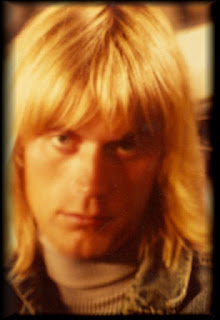 |
| Hollywood CA. 1973 |
Slap was ready for a change and Motown Records was leaving Detroit for the sunny skies of California. Hooray for Hollywood!

In July 1973, Slap received a call from former partner John
Angelos, who was already garnering some success in Hollywood. He was writing songs for a new Joe
Cocker album and working on yet another for Native-American guitarist Jesse Ed
Davis, and urged Slap to join him. The two wanted to work together again, so
Slap sold his Harley and used that cash to fund a trip to L.A. for the next phase of his career. The
two friends formed the L.A. version of Mighty
Quick in late '73, adding Detroit bass-player
Rick Rinz, drummer Barry Anderson, and Bob "Buffalo" Roberts, of Ruben and the Jets,
on tenor sax. The first months in the new environment were like living in a
dream for Slap; after all, Hollywood
was the land of fantasy. Residing in Beachwood
Canyon just a short jaunt
from Sunset Blvd & Vine, Slap and Angelos began putting together a new set
of material more suited for the times.
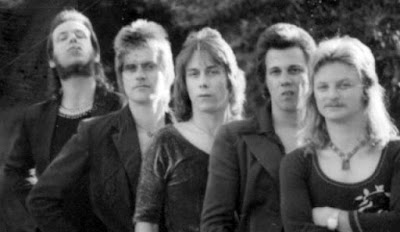 |
| Griffith Park, LA. 1975 |
Topical pop tunes were mixed with a touch of Detroit edge and soul, but not as raw as the
sounds of the Stooges, New York Dolls or the MC5. The two collaborators
combined their previous teamwork with a newer sound, transformed to appeal to
youth, yet filled with deeper meaning. Angelos brought his talent as a
lyricist, vocalist and harmonica player to Slap’s acquired skills at
composition, arrangement and guitar. Angelos penned "Rock & Roll Kids" about Slap while also creating the melancholy, soulfully bluesy
"The Same Old Song," recorded at Mystic Sound Studios. For the next
two years, their numerous tunes were showcased across Southern
California, along with that of other up-and-comers, like Van
Halen, the New York Dolls, and Iggy (Pop) and The Stooges.

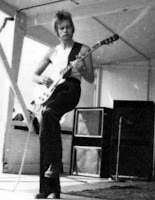
An influx of other Detroit
groups/musicians coming to L.A.
included New Order with Dennis Thompson,
Flack with Marc Falconberry, Punk with J.T. Youngman, and The Dogs. One of
Slap's favorite studios was Goldstar, where the legendary Phil Spector created
the "wall of sound." While there, Slap met John Lennon and David
Bowie when they were collaborating on the "Fame" record. Needless to
say, he was spellbound having access to so many of the artists he truly admired.
The Rainbow Bar & Grill on Sunset Strip in West Hollywood was a famous era hangout/eatery and there were
many nights that Slap and other entertainers spent reminiscing there or at the
neighboring nightclub, Rodney's English Disco. However, the environment was
becoming very competitive and by early 1976, the L.A. music scene was shifting with the
popularity of disco and punk. Slap began working with Hollywood’s independent label Franklin
Records adding guitar on recording sessions for their artist roster and
commercial/jingle productions. |
Dollar Varden 1976
Franklin Records |
He used this opportunity to network, connecting
with numerous agents, managers, studios and musicians to create additional
outlets for his future plans. As a result, his skills as a recording guitarist
improved immensely, and Slap found session work at RCA, Capitol, Wally Heider
Studios, A&M and Goldstar. He rented a rehearsal room within the former Paramount lot on Sunset and Gower, with sound stages
utilized by popular recording groups on tour. It was also an outlet for
mingling with musicians he had met in earlier years: Alice Cooper, Eric Burdon,
and Joe Walsh. An added plus was the ability to listen to the Eagles rehearsing
"Hotel California," Fleetwood Mac working on "Rumours,” and Gary
Wright arranging "Dreamweaver" and more.
 |
| John Angelos 1976 |
In 1977 Angelos was working on a second album project with Jesse
Ed Davis, so Slap approached the latter hoping for a second guitarist spot in
their group. But Davis
was already mentoring another upcoming guitarist, Walter Trout. As it turned
out, the labels were not interested in a second Davis
solo venture, so Davis left for Hawaii and Angelos returned to Detroit and in time formed the Torpedoes.
Through his longtime Roseville
friend and neighbor, Dennis Cooper (who was working as a limo driver), Slap
gained backstage passes and access to various parties. He subsequently met some
of the performers he admired most: Jeff Beck, Bobby Womack, Keith Richards and
Ronnie Wood.
At just 27 years old, Slap found his Hollywood years drawing to
a close, along with a valuable lesson: It’s often who you know rather than what
you know. He also learned the value of networking and not burning bridges. His
remaining time in Hollywood was spent sharing
ideas with future album collaborator, guitarist Steve Powell, while Slap added
trips to Detroit and New York in search of his next project.
 |
| Echo Park, LA. 1977, Photo by Chuck Krall |
Into
the 80s…
Responding to an ad for a guitarist singer/songwriter placed in
Rolling Stone Magazine by former members of Detroit's own MC5, Slap returned to his
hometown. He then auditioned in a Wyandotte,
MI studio for the new group being
formed by drummer Dennis "Machine Gun" Thompson and bass-player
Charlie Bell.
 |
| Detroit MI. 1980, Photo by Charles Whitelock |
The collaboration was an instant success and included Slap
presenting at least a dozen new tunes he had prepared to share. Thompson
assured his partners that he had sufficient connections with management and
labels to get this new project off the ground, and Slap accepted the offer to
join. Discussion followed about other band plans and they chose a name: The
Secrets.

Rehearsals began in January, 1980 and scheduled performance
dates began to roll in. The music ranged from pop rock to new wave and
rock-reggae, allowing Slap to incorporate much of his past experiences through
lyrics and blending musical genres and arrangements as he and Bell shared lead vocals. They began their
quest in the burgeoning Detroit
nightclub and concert scene at places like Bookie’s Club 870 and the Red Carpet
Lounge, a local Punk Archive. Immersed in recording demos of newly-created
material at area studios, they finally released Slap's pop-rock single,
"Escape (Cry a Little Harder)," and the hard rocker, "Ain't Life a Bitch" through Motor City Records. But, after a year of performing
together, Slap was growing weary of all the duties required in fronting a band,
writing new material and playing lead guitar. He invited guitarist Steve Powell
to join them, but Steve was reluctant to leave L.A., so they considered adding Mike Skill.
Recently having left the Romantics (of “What I Like About You” fame), Skill had
been occasionally stopping by the Secrets’ rehearsal studio to listen in. As
fate would have it, however,
Bell was involved
in a serious car accident in February, 1981 and sidelined for several months
while Thompson accepted an offer to tour
Australia with another group.
Disappointed by this turn of events just as the band was building momentum
following a tour of
Toronto,
Slap hoped Thompson would come through with his prior assurance of major label
attraction. It was a hope hinged on touring in the spring in
New York City and along the East Coast.

Finally reunited in June, 1981, they commenced performing in Detroit, in the same
spots where they’d performed the previous year. Thompson grew more irritable at
promoters, leaving the group altogether that summer. Slap was furious with
Thompson’s action, feeling he had wasted nearly two years of hard work at that
juncture. The two never met again until 35 years later.
In the meantime, Slap reached out to his former partner, John
Angelos, who was gaining some notoriety with his group, the Torpedos. He’d
hoped to possibly fit into that ensemble, but Angelos’ personal problems
resulted in even him exiting the group. So, at Slap’s 30th birthday party in
August,1981, he made a career announcement to those gathered. Centered at his
farm in New Haven, MI,
with the presence of friends and road crew of the Secrets and Torpedos, Slap
announced he was leaving Detroit permanently to
return to Los Angeles, where he had already
secured a beach house in the Malibu
region.
It was going to be California
girls and lifestyles of the rich and famous from here on out, he thought.
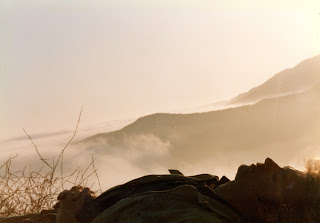 |
| Malibu CA. 1983 |
Slap arrived at Rancho Sea Air on the Pacific Coast Highway in January, 1982 to
launch the next phase of his career, a horse ranch where producers, directors
and their children came to learn to ride. It was already famous for being the
locale where Elizabeth Taylor had trained for her role in “National Velvet.” It
promised to be a great environment for Slap to heal his mind, body and spirit
from the failure of the Detroit
venture. The sea air, warm weather and beautiful views of the Pacific
ocean would do him good.

It wasn’t long before fate stepped in again and this time it
was a sure thing, with an ad placed in a local newspaper in March, 1982. Slap
subsequently joined the staff of Valley of the Sun (VOS) Publishing in Malibu. The small
corporation was headed by Dick Sutphen, a successful author and
human-potentials trainer whose interests were in past-life regression hypnosis
and seminar-training events. Besides offering books, hypnosis and lecture tapes
through its quarterly magazine, "Master of Life," VOS also offered a
small line of music tapes for meditation, including the work of soothing
composer Steven Halpern and pianist David Naegele. Known first as "Inner
Harmony Music,” the term later evolved to “New Age Music.” Slap soon rose to
the position of recording engineer and producer of Sutphen's narratives in a
small, two-track tape recording studio in the VOS offices on Pacific Coast Highway. Having spent most
of his recording studio experience as a performer, he was eager to learn the
skills behind the soundboard in the mixing room, recording, processing sounds,
editing tape and producing a master recording for duplication. Although the
music style was new to him, recent years had increasingly piqued his interest
in jazz improvisation, especially while listening to Wes Montgomery, Charles
Lloyd, Miles Davis, George Benson and Herbie Hancock.

 Inside and hangin' out at VOS studio
Inside and hangin' out at VOS studio In November,1982, an unfortunate horse-riding incident resulted
in a badly-broken leg for Slap, followed by surgery and a week-long hospital
stay. During the numerous months that accompanied his sojourn on crutches, he
began formulating ideas for his own style of music, dubbed "Music for
Creative Visualization." Slap composed an entire album's worth of
instrumentation, loosely based on a recurring dream he’d had since childhood.
Through a coffee-shop buddy, guitarist Domenic Buscemi, they secured time at a
small 8-track studio to begin recording in the summer of 1983.


The new creations were rooted in musical elements of classical,
jazz improv, soft rock and film-scoring themes. Slap was heading in a new
direction, incorporating all the styles he’d experienced earlier in his life’s
travels. The spontaneity and unorthodoxy of the recording sessions, utilizing
acoustic and 12-string guitars, synthesizers and special effects, led to his
first solo album, "Mystic Memories,” released by VOS in late 1983. Slap
continued to expand his vision of music and tonalities, while mastering the
craft of recording and producing records.
He became music director and producer for the New Age label until 1993,
recording 12 solo albums. He also attained numerous production album credits
with a variety of other artists who signed with the label during that period.
As Valley of the Sun grew its artist and album base, it was also building
larger audiences through the popularity of the New Age movement, meditation,
reincarnation, karma, and alternative healing. VOS’ distribution network now
extended worldwide and Slap's music was gaining international exposure and
acceptance.
 |
| Slap & Powell 1989 |
By the late 80s, Slap was contemplating yet another career
shift – this time to film and TV music. Having composed the music for the video
documentary, "Sedona: Psychic Energy Vortex" and the "Video
Hypnosis" VHS series written and narrated by Dick Sutphen, Slap was
preparing for another change. Calling upon his longtime friend, guitarist Steve
Powell, a project was embarked upon to build a library of TV and film music in
hopes of placement. The team’s music was upbeat and dramatic, with influences
from composers Jan Hammer (theme from “Miami Vice”) and Wang Chung (“To Live
and Die in L.A.”)
and the German band, Tangerine Dream. Some of this collaboration was compiled
for the "Drive" album, released through VOS in 1990. By then, Slap
was a member of The Recording Academy (presenter of the Grammy Awards), and the
Audio Engineering Society (AES), keeping
abreast of the latest trends in the business and technology sectors as
well as pioneering the use of midi guitar innovations into recordings.
In addition to his duties at Valley of the Sun, he returned to
live performance, and established the jazz/fusion group,
Lateral Movement, with
Karl Schaffner on guitar and bass, flutist Suzanne Ghiglia Arthur and Marie
Matson on percussion. They performed locally, and most notably with Todd
Rundgren at the
Hollywood
Palace. After Schaffner
left
L.A., Slap
formed a duo with multi-instrumentalist Bray Ghiglia, former member of the
Roberts/Meisner band. Roberts was formerly with Firefall while Meisner with the
Eagles. Their musical relationship continues to this day, and Bray has been
featured on several of Slap's recordings throughout the years.
The New Century’s
Launchpad: The 90s
Once the last decade of the century debuted, Slap was busily
producing a series of recordings for Great American Audio Corp, including a
line of aerobic exercise music, "Walk to the Beat," and the popular
"Music for Relaxation" series; both were distributed nationally
through bookstore outlets.
Venturing into the Sci-Fi Horror genre, Slap created a series
of books on tape of select authors for Spine Tingling Press, featuring Hollywood voice-over actors, music and sound effects. His
work received musical placements on the Leeza Gibbons show, the Playboy
channel, NPR radio, and various TV commercials. Slap also composed the music
for a documentary on the life of Takemusu Aiki, the founder of Aikido martial
art, which was widely distributed in Japan
and released in the U.S.
with subtitles. The Eastern music influence is primarily credited to the
diverse Japanese composer Ryuichi Sakamoto, who originated in the field of pop
music.

Rather than dwell on past successes and failures, Slap had by
then learned to strive along explorations of new avenues of musical tonalities
and genres. What also emerged was the philosophy that improving one's musical
abilities through practice and education is critical to evolving and innovating
in composing. He completed the Film Scoring Certification Program at UCLA in
1992 and studied music theory with Professor Kenneth Koenig, former
pianist/arranger for the Bob Hope orchestra, Don B. Ray (Twilight Zone, Hawaii
Five-0, CBS orchestra director), Gerald Fried (Roots, Star Trek, Mission
Impossible, The Man from U.N.C.L.E.), Academy Award-winning composer Hans
Zimmer, Emmy Award-winning composer Mark Waters, and Jerry Grant (Quantum Leap, Hunter, Magnum
P.I., The A-Team).
In the There and Back Again Category, when Slap left his
position at Valley of the Sun in November, 1992, he had broadcast licensing
placements as well as an established private client list. The purpose of the
latter was to track people who recognized the power of healing music: mental
health therapists, massage and physical therapists, doctors and hospitals. Slap
wanted to contribute to helping others through his recordings. The more ambient
and sustaining ethereal tracks were explorations into sound design, using
pentatonic synthesis, voices, chanting and sounds of nature, and Slap continued
this work for several more years. The “Eternal OM”, recorded in 1986 has become
his most popular production for
meditation worldwide and is still widely used and available today on all
digital platforms.

However, his dream of landing a major film score never
materialized, and with parents and family having health
problems, Slap returned to the midwest. It was 1994
and near the shores of Lake Michigan, 60 miles east of Chicago. By this time, Slap had acquired his
own recording equipment and soon set up a home studio seeking new projects. TM
Productions, located near his home, commissioned him to produce additional
music for their popular children's video series, "I Love Toy Trains"
including "I Love Big Machines" and "A Lionel Christmas."
Next Slap landed a producer/engineer position with the GMP Music Library in
nearby Buchanan, MI. There, he worked full-time in the studio
producing and editing music for their library that was available for film,
video and TV licensing. The facility was a state-of-the-art, 24-track digital
studio that also offered hourly studio rates to local musicians. Composers
nationwide were submitting music in need of formatting and preparation for delivery
to music supervisors. Slap also contributed several albums of production music
to the library, and it is still active today.
And yet, Slap was growing tired of writing music for others. He
often felt as if he was giving away some of his best material, so he left GMP
at the end of 1996. The serious composer within him was dominating his
thoughts, causing frustration with the opportunities presenting themselves and
the shifting nature of the music business.
Slap never wanted to wind up being an old guy playing blues in
a bar or in being part of a tribute band. He had pursued his career ambitions
for more than 30 non-stop years, sacrificing relationships, hobbies and many of
his prior interests enjoyed in his youth. With a royalty stream still active
from his music sales, licensing and a profit-sharing pension pay-out in place,
Slap walked away from it all by the millennium and returned to study, receiving a B.A. degree in Computer Programming & Technology from Purdue University. He did not return to the music
business until events in 2014 rekindled his desire — and then he had the
Internet at his disposal.
The long and winding
road into the 21st century…
As the years have passed, Slap’s main interest has centered on
studying chordal structures of 20th century tunes from the 20s, 30s,
40s, bebop jazz, and their bearing on the music of his era. He also found it
amusing that public interest in "Garage Rock" and early "New
Age" sound was reviving. He’s often received messages from listeners
inquiring where his music was available — some after hearing vintage Tidal
Waves tunes on oldies radio programs, some wanting more info on retro album
compilations or some hearing his compositions for the first time.
During Slap’s hiatus from the often chaotic world of music,
Valley of the Sun had ceased selling music and had been tied up in litigation
for years in determining who owned the rights to the product line. As a result,
he had not received any sales royalties in a long time – until 2014 when he was
suddenly contacted by his performing rights organization (PRO), BMI. He had
registered each of his original compositions throughout his career, and BMI
wanted to verify that he was the writer/producer listed for all the titles he
published through VOS. The writer/publisher share was always a 50/50 split for
fees collected from non-sales commercial broadcasts. Amazingly, shortly after
that contact, Slap started receiving back royalties that were withheld for
years during pending litigation. This led him to review his library of
unfinished or unpublished creations that during the hiatus was sitting dormant.
 |
| Grammy Awards 2016, Photo by Kahne Krause |
With the unexpected funding in hand, Slap embarked on yet
another journey, although the road back to the industry was neither quick nor
easy. He spent up to three hours per day playing guitar for the next two years,
and he updated his studio to 2016 standards with new equipment. He tested the
waters by putting together a two-CD demo of unreleased material to tempt
various labels, critics and radio stations to review. A return to Los Angeles to attend the
2016 Grammy Awards also afforded the chance to network with old friends, new
artists and promoters. Slap joined the newly-formed Indie Collaborative, an organization
devoted to uniting independent artists outside of the mainstream record label
market.
 |
| HMMA Awards Show 2017, Hollywood, CA. |
Reconvening with Bray Ghiglia, Slap laid out plans to record
some new material, inviting him to his Indiana
home studio later that year to join him in working on some new tracks.
Performing live again as a duo at an Indie Collaborative event in Chicago was also in the works, followed by Slap connecting
with Bongo Boy Records in New Jersey
to release his recording of "Modern Medicine". The blues-rock piece
presented a social commentary on the era’s opioid crisis, with Slap on lead
vocals and guitar and Ghiglia on tenor sax. It was released on the compilation
album, "Backroom Blues Vol. 4" in 2017, after which Slap, once again,
returned to L.A.,
this time for the 2017 Grammys. The duo rounded out that event by
performing live at two shows that week.

Later in 2017, Slap released the instrumentals, "Healing Temple"
and "Sahara" on Bongo Boy Records’
"Escape the Mind Vol. 1" compilation album. The 2018 follow-up was
another instrumental, "Aspara," for Bongo Boy on "World Music
Vol. 1." Things were progressing again, and he reached out to yet another
old friend in Detroit,
harmonica player Larry Minne. Developing projects followed when Minne suggested
they record a new version of "The Christmas Song", with veteran
R&B singer Charles "Buddy" Smith. That led to Slap arranging a
newer version, which was included on "Let’s Have a Rockin' Christmas Vol.
3" released by Bongo Boy in 2018. In early 2020, Slap contributed another
New Age instrumental, "Migration", to "Escape the Mind Vol.
3."

The uptick in activity didn’t go without notice; in early 2019,
Slap was approached by an A&R representative for Numero Group, a
Chicago-based record label specializing in retro music from the 70s, 80s, and
90s. Its primary focus was to bring attention to artists believed to be
underappreciated, artists who deserved another look. Numero Group did its
homework, and the first conversation with Slap caught him by surprise. The firm
was familiar with his entire catalog, not just from Valley of the Sun, but also
from Great American Audio and other projects, and Numero Group was able to
identify the music by his style. An offer followed – to buy his entire catalog
if Numero Group could be retained to negotiate and secure the copyrights and
ownership of the master recordings. For the next year, Slap focused on those
objectives, although many of the VOS masters and contracts had disappeared. By
2020, he provided contacts for other VOS artists and Dick Sutphen and secured a
deal ensuring that Numero Group would buy the entire Valley of the Sun music
catalog. This entailed the original music being re-mastered, re-packaged and
available through downloads, streaming, CDs and on vinyl with album notes and
pictures. The "Drive" album that was reissued in 2020 will be
followed by two or three more per year going forward. And although Steve
Powell, Slap's co-writer on that initial recording, sadly passed away in 2004,
the pair’s dream is finally coming true. Slap will not only see that work
appreciated again, but also appear with impressive packaging, artwork and
merchandising.
.jpg)
With his legacy secured and productive gains due to downtime of
an interim pandemic, Slap planned to make 2022 a special year. He wanted to
work on something more unique, something with a message to the world that
reflected the times. Recalling the efforts he made with the "Christmas
Song," Slap targeted the 1973 Timmy Thomas song, "Why Can't We Live Together?" Gathering Charles "Buddy" Smith on lead vocals, Larry
Minne on harmonica and adding singer/songwriter Audra Kubat on vocals, he added
background vocals and all additional instrumentation. He was seeking a true
Detroit sound, so in September, 2021 he travelled to the Motor City and
recorded each musical part before returning home to finish the track and mix. Slap had planned on a 3-minute result, but improvising during
the session incorporated additional unplanned sound elements and arrangement.
He was pleased with the end product, and added "Together Again" as the B-side with Ghiglia soloing on
alto sax.

On February 1, 2022, a contemporary jazz instrumental, "The Looking Glass", debuted and featured Ghiglia on flute. "Why Can't We Live
Together?" followed on Valentine’s Day in an A/B product arrangement. Soon
after, Slap created a video to complement the record’s theme, a powerful
message that is also available on YouTube. The song and video were met with
widespread acclaim, resulting in his receipt of the "Best Production"
award from Intercontinental Music Awards in July.

The subsequent record/video reflection on Slap’s Malibu life, "90265" was released in July, followed by his percussive
African-themed offering, "Serengeti" in August. Completing the
summer trifecta in September was "Voodoo", a dark, mysterious jazz groove, and
one of his favorite compositions. “Voodoo” was subsequently awarded the best
song in Instrumental/Jazz from the Los Angeles-based Akademia Music Awards.
"Why Can't We Live Together?" was placed on the 2023
ballot for the Grammys in the category of "Best Traditional R&B
Performance." However, Beyonce won the award at that time. But, Slap had already moved into the major players game.
As 2023 progresses, more promise looms; HBO has licensed his
music for the third season of the popular documentary series in
New York, "
How To with John Wilson". His music appears on the newly released documentary film "
Welcome Space Brothers" directed by
Jodi Wille. His first album of the series,
"
Atlantis: Crystal Chamber", was re-released in November, 2022
through Numero Group, while the second album,
"Atlantis: Healing Temple," was released April 2025 followed by the soundtrack
Zen Morning in August 2025. Numero Group has been releasing several albums each year with a 2 record compilation released in December 2024.
Slap signed a new recording contract with Desert View Records in 2024 and is producing a new music catalog of contemporary TV/Film music for licensing, along with releasing several contemporary instrumental singles available on all streaming channels.With this ongoing productivity during the
last decade, Slap is at last doing what he wants to do and at his own
pace.
His philosophy is:
"Music is created to generate an emotional response, and life is a
tapestry of ever-changing moods, colors, textures, and emotion. Music reflects
life, touching our souls' strings, pulling into the open our feelings with
passion. It is the only medium through which I can, and many more in humanity,
truly express our innermost feelings, the essence of our being."
 |
Photo by Wendy Hakes
|
A very special thanks to all those I have met over the years,
sharing their memories and photos of our times together.
Researched, written and edited by Wendy Stevenson Clem
from notes provided by Robert Slap






























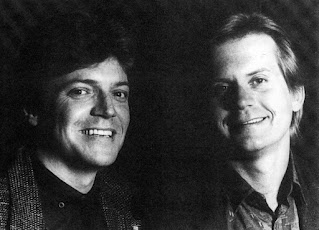





.jpg)






